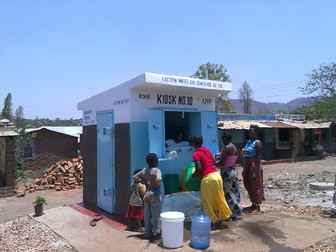Cooperative Development Program (CDP)
Grant funds are being used to provide technical assistance, applied research, technical training, and cooperative education activities in more than 20 countries of Africa, Asia and the Near East, Europe and Eurasia, Latin America and the Caribbean.
The Agency for International Development is an independent Federal government agency that provides economic and humanitarian assistance in more than 100 countries to ensure a better future for us all.
Relevant Nonprofit Program Categories
Program Accomplishments
In fiscal year 2002, 8 grants were extended through FY 2004.
Uses and Use Restrictions
Grant funds may be used, among other things, for basic feasibility studies and providing technical assistance or advisory services to cooperatives, private voluntary and other non-governmental organizations, governments and groups of individuals that wish to develop new cooperatives or improve existing cooperatives.
Emphasis is given to developing, testing and implementing solutions to major issues facing international cooperative development including, but not limited to, governance, modern management, cooperative legislation and regulation, achieving scale and salience.
Eligibility Requirements
Applicant Eligibility
Applicants eligible are U.S.
cooperatives and recognized cooperative development organizations (CDOs) that are organically-linked to cooperatives and groups of cooperatives and whose demonstrated capabilities are broadly consistent with USAID's strategic objectives.
Beneficiary Eligibility
Cooperatives and their members in USAID eligible countries.
Credentials/Documentation
Evidence of legal capacity, economic feasibility, and financial responsibility relative to the activity for which assistance is requested.
Aplication and Award Process
Preapplication Coordination
As may be specified in a published Request for Applications (RFA).
This program is excluded from coverage under E.O.
12372.
Application Procedures
As may be specified in a published Request for Applications. This would normally include, but would not necessarily be limited to Forms SF-424 and 424A, as well as the applicant organization's name, address, contact person and information; project objectives; funding and budget; proposed partners; executive summary, organizational overview, program description, program management and structure; monitoring and impact assessment; cost proposal with budget narrative; planning matrix; staffing plans with resumes of key personnel; letters from proposed partners evidencing knowledge of the program and agreement to participate; evidence of concurrence from USAID missions in countries of proposed implementation; and a summary of USAID-financed activities conducted over the three years preceding the application.
Award Procedures
Applications are submitted to the Cooperatives Coordinator, Office of Private and Voluntary Cooperation, Democracy, Conflict and Humanitarian Assistance Bureau. All applications are reviewed by committees that include a technical reviewer with knowledge of the specific area of cooperation concerned as well as knowledgeable USAID officials drawn from different Bureaus. Each application is scored by all participating USAID officials using criteria incorporated in the Request for Applications. Awards are given based on relative scores.
Deadlines
Specified in the published Request for Applications which appear on the DCHA/PVC web site and in the Federal Register.
Authorization
Foreign Assistance Act of 1961, as Amended, Public Law 87-195, Sections 111, 123 and 311.
Range of Approval/Disapproval Time
Approximately three to four months from the receipt of applications.
Appeals
If an application is rejected, the reasons for rejection are fully stated.
Renewals
Not applicable.
Assistance Considerations
Formula and Matching Requirements
There is not formula for matching requirements. Applicants may be encouraged to achieve a target match which would be incorporated in the Request for Applications.
Length and Time Phasing of Assistance
Cooperative Development Program cooperative agreements are generally for a period of three to five years and may be extended for a total period not to exceed ten years.
Post Assistance Requirements
Reports
Each award recipient is required to provide Annual Work Plans, Semi-Annual Progress Reports and Quarterly financial statements (Form 269A).
Additional reporting may be required to support Congressional requests for information.
Audits
In accordance with the provisions of OMB Circular No. A- 133 (Revised, June 27, 2003), "Audits of States, Local Governments, and Non-Profit Organizations," non federal entities that expend financial assistance of $500,000 or more in Federal awards will have a single or a program-specific audit conducted for that year. Nonfederal entities that expend less than $500,000 a year in Federal awards are exempt from Federal audit requirements for that year, except as noted in Circular No. A-133.
Records
The grantee shall maintain adequate records and accounts to assure that grant funds are used for authorized purposes.
Financial Information
Account Identification
72-1021-0-1-151.
Obigations
FY 07 $5,500,000; FY 08 est not available; and FY 09 est not reported.
Range and Average of Financial Assistance
From $1,000,000 to $5,000,000 over five years.
Regulations, Guidelines, and Literature
Code of Federal Regulations Title 22, 228 Volume 1, Parts 1 to 299 (Revised as of April 1, 1999); USAID Automated Directive System, specifically Series 300 and cross-references.
Information Contacts
Regional or Local Office
Not applicable.
Headquarters Office
Cooperative Coordinator, Office of Private and Voluntary Cooperation, Bureau for Democracy, Conflict and Humanitarian Assistance, United States Agency for International Development, Washington, DC 20523. Telephone: (202) 712-5226.
Criteria for Selecting Proposals
Preference is given to applicants that have demonstrated significant contributions to international cooperative development, that propose activities that promise a substantial addition to the theory and practice of cooperative development, that demonstrate the commitment to integrate lessons learned into their own programs as well as disseminate these to the broader cooperative development community, and whose staff possess the range of skills necessary to achieve these results.
Social Entrepreneurship
Spotlight
When it Comes to Social Enterprises, Failure is the Best Platform for Innovation

In the world of social enterprises, failure is a cringe-worthy moment nobody wants to talk about. But, social entrepreneurs can benefit from their failures.

